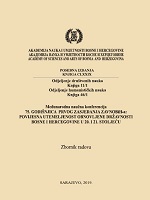PRINCIPI ZAVNOBIH-A I POLITIČKA I DRUŠTVENA REFORMA U SR BOSNI I HERCEGOVINI 1960-IH GODINA
PRINCIPLES OF ZAVNOBIH AND POLITICAL AND SOCIAL REFORM IN SR BOSNIA AND HERZEGOVINA IN THE 1960s
Author(s): Dženita Sarač-Rujanac
Subject(s): Political history, Post-War period (1950 - 1989)
Published by: Akademija Nauka i Umjetnosti Bosne i Hercegovine
Keywords: Bosnia and Herzegovina; the National Anti-Fascist Council of the People’s Liberation of Bosnia and Herzegovina (orig. abbrev. ZAVNOBiH); statehood; equality; reform;
Summary/Abstract: The constant changes and a permanent search for solutions that should have made the Yugoslav state sustainable are characteristic for the entire socialist period of its existence. The radical transformation of Yugoslavia was initiated in the 1960s, and the goal was democratization and decentralization whereby, among other things, the sovereignty and statehood of the republics should be strengthened. The reform orientation of the Yugoslav leadership reflected significantly on Bosnia and Herzegovina and the activity of the republican leadership. During the 1960s several parallel processes took place in the Republic. The reform implied internal consolidation and integration of the Republic, but concurrently strengthening its position as an equal republic in Yugoslavia. The strong intervention of revolutionary-progressive current in the leadership for vivifying these goals was accompanied by intensified rhetoric on the revolutionary heritage of the National Liberation Struggle (orig. abbrev. NOB) as the fundaments of Bosnia and Herzegovina. The essential values of the National Anti-Fascist Council of the People’s Liberation of Bosnia and Herzegovina (orig. abbrev. ZAVNOBIH) have been rediscovered. The principles of ZAVNOBIH have been becoming the connective tissue of the Bosnian-Herzegovinian society in the 1960s. After 1965, the rejuvenated leadership initiated multi-year debates on numerous open, material and non-material, issues that burdened and significantly slowed down the socio-economic progress of Bosnia and Herzegovina. Under the strong influence of events in the Federation, Bosnia and Herzegovina studiously approached the issues of the position of Croats, the status of Muslims, but also the undoubtedly presented unitarist tendencies. On the other hand, the leadership has been stepping out more openly with the ascertainment concerning the federal centre’s neglect of the Republic and the insensitivity of other republics. No less significant, the republican leadership systematically approached the defining of the necessary platform, as well as the concrete realization of numerous projects that contributed to its inauguration as a unique entity, an equal and prosperous Republic that relies on its own strengths and capabilities. Some authors mark the end of the 1960s as the beginning of the golden era of Bosnia and Herzegovina and the perennial development of all segments of society that has been promising the common man a lot. However, this progress was in close bond and dependency on the broader Yugoslav context which would reveal at the beginning of the 1970s that the fears of losing the common interest and the disintegration of Yugoslavia were not groundless.
- Page Range: 197-218
- Page Count: 22
- Publication Year: 2019
- Language: Bosnian
- Content File-PDF

